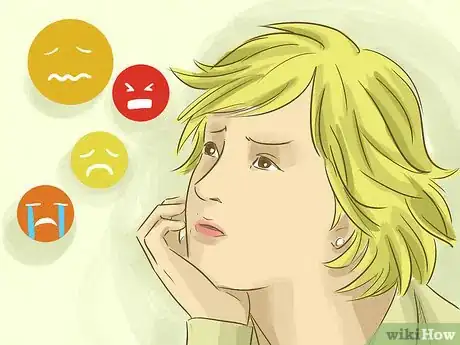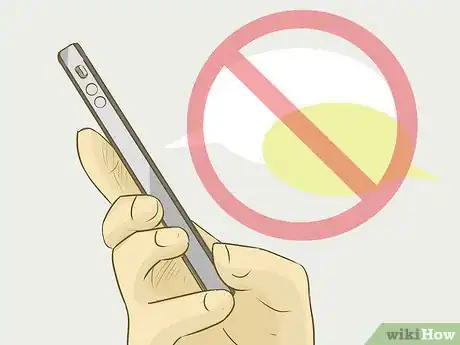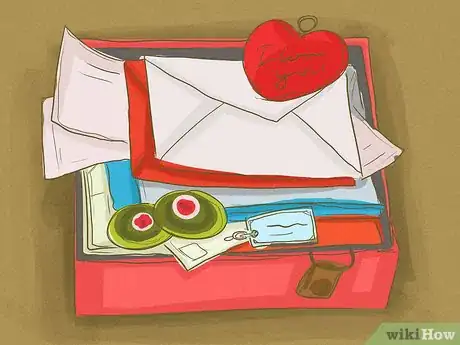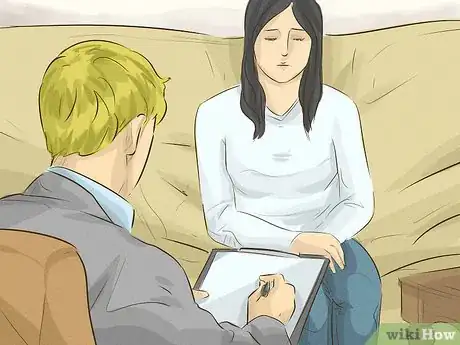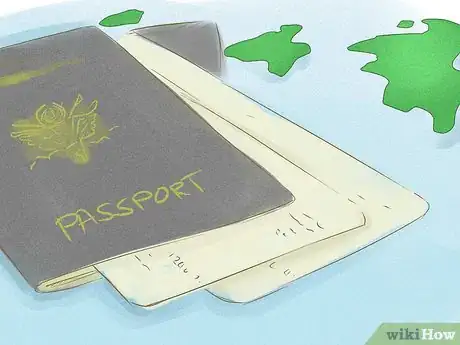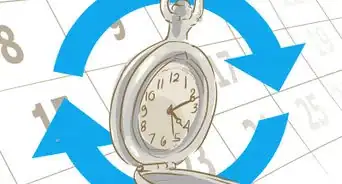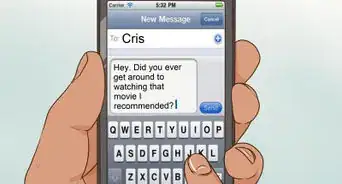This article was co-authored by Amy Chan. Amy Chan is a Relationship Coach and the Founder of Renew Breakup Bootcamp, a retreat that takes a scientific and spiritual approach to healing after the end of a relationship. Her team of psychologists and coaches has helped hundreds of individuals in just five years of operation, and the Bootcamp has been featured on CNN, Vogue, the New York Times, and Fortune. She has published a book on her work, Breakup Bootcamp.
There are 11 references cited in this article, which can be found at the bottom of the page.
This article has been viewed 36,302 times.
When two people get into a relationship, they look towards a happy future together. But what happens if they break up? Sadness, anger, bitterness, stress, and heartache. Learning to let go is necessary because life will go on with or without your partner. Moving on is not easy, but it is possible.This article provides a number of steps to help you move forward and successfully get over a relationship.
Steps
Mourning the Relationship
-
1Understand your own feelings. Denial doesn’t solve anything. Ignored emotions will only make you calloused and afraid.[1]
- If you need to cry, do so. Crying clears your mind and helps you vent your emotions. Repression never helps anyone, so be honest about your ever-changing feelings.[2]
- If you don't feel like crying, maybe head to the gym and find an available punching bag or go for a long, hard run. Vent your anger and hurt with someone close to you. Try to avoid doing something you would regret; just remember the person you are venting to is just trying to help.
-
2Cut off contact. Don’t try to be friends, at least not during the early stages of the breakup. Avoid cyberbullying and do not keep harassing your ex with texts or calls.“Out of sight” doesn’t necessarily mean “out of mind." Nevertheless, creating intentional space will make getting over an ex easier.[3]
- The easiest and healthiest way to get over someone is to initiate clear boundaries. Don't text or call him/her. Unfriend him/her on Facebook, unfollow him/her on Twitter. Consider changing your own relationship status online too![4]
Advertisement -
3Get rid of reminders. Get rid of anything that belonged to him/her and anything that reminds you of the relationship, like photographs or mementos. Let yourself mourn and start fresh, with no lingering reminders or memory triggers of what once was.[5]
- You don't necessarily have to throw out his/her old stuff or your mementos. The most important thing is that the items remain out of your view so as not to hinder your recovery. However, if you do choose to keep them, lock them away and only look at them after you are over the relationship and can reflect on the past without hurt, bitterness, or anger.
-
4Write in a journal. Writing is very therapeutic and is often recommended by therapists as a way to cope with grief.[6]
- Write your ex a not-to-be-sent letter. Doing this will help you process your emotions. Reread your words and try to identify what is really bothering you - and what you need from a relationship going forward. What, in your mind, was the reason for the failure?
- Write also to yourself. Tell yourself in words why the relationship wouldn't have worked, regardless of who ended it. Be honest about the good and the bad times. Writing it down forces you to be more cognizant and reflective about what happened since you need to find the proper words to articulate your experience.
-
5Accept. Accept the facts. Accept that your relationship has ended. It is not only about accepting the negatives sides of the relationship but also about the positives. Understand that Everything happens for our own good. This is one of those magical formulas that would help in the process of acceptance. Once you accept and realize the true facets, things would become easier.
Finding a Support System
-
1Talk it out. Ask a friend who is a good listener to let you freely discuss the breakup. Confide in your friend and let this be an opportunity for you to "get it all out there."[7]
- Sometimes saying the words out loud and to someone else can help with the recovery process. UCLA researchers have found that even if you don't uncover any new insights, simply naming and verbalizing feelings can mitigate sadness and anger.[8]
-
2Spend time with family and friends. Try not to spend too much time alone until you're either over it or you've sorted it out; the immediate aftermath of a breakup is when you're most likely to think about the situation too deeply and being with friends/family can help take your mind off it.[9]
- Use the end of your relationship as a way to figure out what was missing from your inner circle. Catch up on much-needed time with the people who know you best: your family and close friends.
- If there is a dance, club or any other activity you enjoy, go with your friends. It's good to get out and remind yourself that there is a whole big world out there. Although you may think that you need to be alone, it's important not to isolate yourself when you're emotionally fragile.
-
3Consult a therapist. If you feel completely overwhelmed with the emotions associated with the breakup and unable to engage in productive recovery strategies, consider seeing a therapist or counselor.[10]
- You should seek external help if your emotions are interfering with your ability to complete daily activities or if you are suffering from conditions exacerbated or attributable to the breakup, such as depression or post-traumatic stress.[11]
Refocusing Your Attention
-
1Distract yourself. Go to an arcade or a movie, go shopping, do anything that will get your mind off of things for a little while. Just make sure you don't go anywhere or do anything that will remind you of your ex.[12]
- Distract yourself by focusing on and helping others. Studies show that the happiest people are ones who give the most to others. When you're depressed, anxious or stressed, there is a high degree of focus on the self. Focusing on other people literally shifts your thinking and your mood from victimhood to empowerment.
-
2Get active. Clear your head with physical activity. It has been proven that staying active and indulging in physical activity releases endorphins - the happy hormones.[13] A strong body can lead to a strong mind.
- Join a gym, running group, or intramural team. Take up a physical activity you've always wanted to try but never got around to doing, like spinning, rock climbing, or yoga.
- Try to go for walks in the evening or take your dog out. A little fresh air can go a long way when your brain is taxed and your heart is weary.
-
3Get a new hobby. Take advantage of the extra time and freedom you now have. Find out what you love doing besides your regular job. Plant trees, learn music or take a cooking class. Learning something new boosts your confidence and can be rejuvenating.[14]
-
4Take a trip. Get away from your current environment, whether that means taking a day trip to the beach or going for a hike, or going to Europe or South America for a few weeks. You might not feel better immediately, but being in a different space will give you a different frame of mind.[15]
- Research has shown that just being outside your home can improve your health, since environmental factors are reliably related to depression, anxiety, and anger.[16]
-
5Set your own goals. You might have had goals for yourselves as a couple; instead, now you can set your own goals for yourself and your life. Thinking about goals is a productive part of reconfiguring your life without that other person.[17]
- These goals might be in terms of your education, job, social or family life, or hobbies or activities. You can make a list, which will help give you direction and much-needed forward momentum in your life (and less time to dwell on the past!).
- See the end of the relationship not necessarily as an end, but as the chance for a fresh start for YOU. Get organized. Figure out what (and maybe who!) you want in life and go after it![18]
Expert Q&A
-
QuestionWhat should I do immediately after a breakup?
 Amy ChanAmy Chan is a Relationship Coach and the Founder of Renew Breakup Bootcamp, a retreat that takes a scientific and spiritual approach to healing after the end of a relationship. Her team of psychologists and coaches has helped hundreds of individuals in just five years of operation, and the Bootcamp has been featured on CNN, Vogue, the New York Times, and Fortune. She has published a book on her work, Breakup Bootcamp.
Amy ChanAmy Chan is a Relationship Coach and the Founder of Renew Breakup Bootcamp, a retreat that takes a scientific and spiritual approach to healing after the end of a relationship. Her team of psychologists and coaches has helped hundreds of individuals in just five years of operation, and the Bootcamp has been featured on CNN, Vogue, the New York Times, and Fortune. She has published a book on her work, Breakup Bootcamp.
Relationship Coach Letting go is the first step to healing. We often hold onto pain because it's the last part of the relationship we have left. But this pain keeps us from moving on. Letting go and recognizing that the relationship is over will let you look forward to new and exciting things to come.
Letting go is the first step to healing. We often hold onto pain because it's the last part of the relationship we have left. But this pain keeps us from moving on. Letting go and recognizing that the relationship is over will let you look forward to new and exciting things to come.
References
- ↑ https://www.helpguide.org/articles/grief/dealing-with-a-breakup-or-divorce.htm
- ↑ https://www.psychologytoday.com/blog/valley-girl-brain/201105/how-want-get-over-breakup
- ↑ https://www.psychologytoday.com/us/blog/living-forward/201508/5-ways-move-ex-you-still-love
- ↑ https://www.psychologytoday.com/blog/valley-girl-brain/201105/how-want-get-over-breakup
- ↑ https://www.psychologytoday.com/us/blog/close-encounters/201806/how-deal-reminders-your-ex
- ↑ https://www.apa.org/research/action/romantic-relationships
- ↑ https://www.psychologytoday.com/blog/valley-girl-brain/201105/how-want-get-over-breakup
- ↑ http://www.scn.ucla.edu/AL/sciam.html
- ↑ https://www.helpguide.org/articles/grief/dealing-with-a-breakup-or-divorce.htm
- ↑ https://www.helpguide.org/articles/grief/dealing-with-a-breakup-or-divorce.htm
- ↑ http://www.helpguide.org/articles/family-divorce/coping-with-a-breakup-or-divorce.htm
- ↑ https://www.psychologytoday.com/us/blog/laugh-cry-live/201502/after-the-break-when-moving-seems-impossible
- ↑ https://www.mayoclinic.org/healthy-lifestyle/stress-management/in-depth/exercise-and-stress/art-20044469
- ↑ https://www.nytimes.com/guides/smarterliving/how-to-find-a-hobby
- ↑ https://www.psychologytoday.com/blog/valley-girl-brain/201105/how-want-get-over-breakup
- ↑ https://www.psychologytoday.com/blog/valley-girl-brain/201105/how-want-get-over-breakup
- ↑ https://www.webmd.com/sex-relationships/features/life-after-divorce
- ↑ http://www.helpguide.org/articles/family-divorce/coping-with-a-breakup-or-divorce.htm
About This Article
Getting over a relationship can be extremely difficult, but you can make things easier by avoiding contact with your ex as much as possible. Try to hide or get rid of any reminders of them, such as photographs, old clothes, and gifts. It will probably be hard to not think about them, but try to distract yourself as much as possible by doing things you enjoy, like listening to your favorite music or catching a movie. You should also spend time with your family and friends to take your mind off your ex and be around people that make you happy. If you find yourself getting restless or agitated, try doing something physical, like going for a walk or hitting the gym, which will release endorphins and help you feel better. For more tips, including how to process negative emotions after a breakup, read on!
